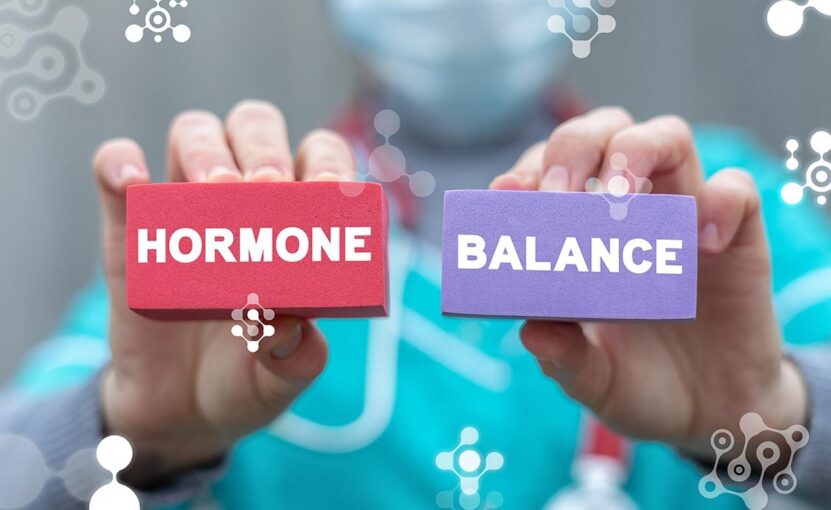
Share Post:
Hormones are your body’s chemical messengers, coordinating everything from energy and mood to metabolism, reproductive health and sleep. When your hormones are balanced, you tend to feel focused, vibrant and emotionally well. However, imbalances can manifest as fatigue, anxiety, irregular menstrual cycles, sleep disturbances, weight gain or skin issues.
While genetics, stress and lifestyle all play a role, what you eat can have a big impact on your body’s chemical balance. Using food to balance your hormones is easier than you might think, once you know which foods to target.
How Diet Influences Hormonal Health

Food affects hormonal balance through several key mechanisms:
- Blood sugar regulation: Spikes and crashes in blood glucose — often caused by refined carbohydrates and irregular eating — can lead to insulin resistance and increased cortisol.
- Inflammation: Chronic inflammation interferes with hormone signaling and has been linked to conditions such as thyroid dysfunction, PCOS and endometriosis.
- Detoxification: Your liver plays a central role in producing, breaking down and eliminating excess hormones. A diet rich in antioxidants, fiber and phytonutrients supports this process.
Many hormones are influenced by diet to some extent. This includes some that are easily put out of balance, such as cortisol, which is released during physical or emotional stress. Melatonin, which regulates a healthy sleep cycle, can also be affected.
Serotonin, key for mood regulation, is also influenced by food, as are the sex hormones estrogen, progesterone and testosterone. Tryptophan — an amino acid vital for hormone production — is also impacted by your diet.
By making the right dietary choices, you can improve the function of these vital chemical messengers and nourish your overall health.
Which Food Can I Eat to Balance My Hormones?
A balanced diet is key to good health overall. However, some foods have a known impact on particular hormones. Here are seven that can be particularly effective. Don’t try to add all of these to your diet all at once — making small, consistent changes makes it easier to form lasting nutritional habits without feeling overwhelmed.
-
Cruciferous Vegetables
Veggies like broccoli and kale contain compounds such as diindolylmethane and indole-3-carbinol that help the liver metabolize and eliminate excess estrogen. This supports a healthy estrogen balance and may reduce the risk of estrogen dominance, which has been linked to certain cancers.
-
Fatty Fish
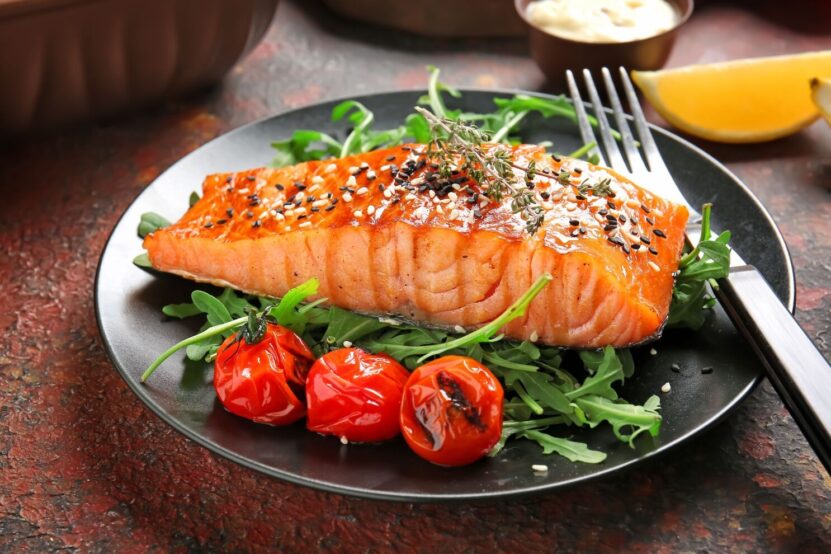
Fish such as salmon and sardines are rich in omega-3 fatty acids. These crucial fats build hormones that reduce inflammation and have also been shown to have important benefits for heart and brain health.
-
Flaxseeds and Chia Seeds
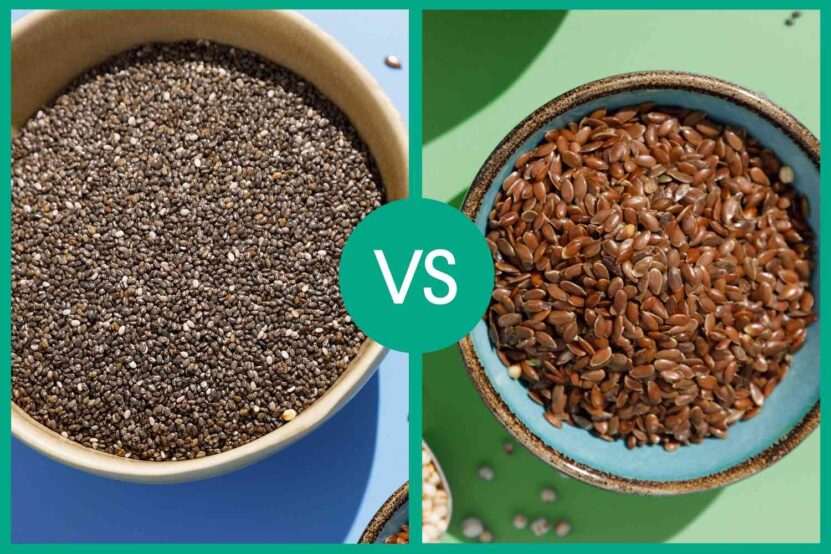
Flaxseeds are high in lignans — plant compounds that help regulate estrogen metabolism – and fiber, which supports the elimination of excess hormones via the liver and digestive tract. Chia seeds are also rich in soluble fiber, plus they are a strong source of omega-3 and omega-6 oils.
-
Avocados
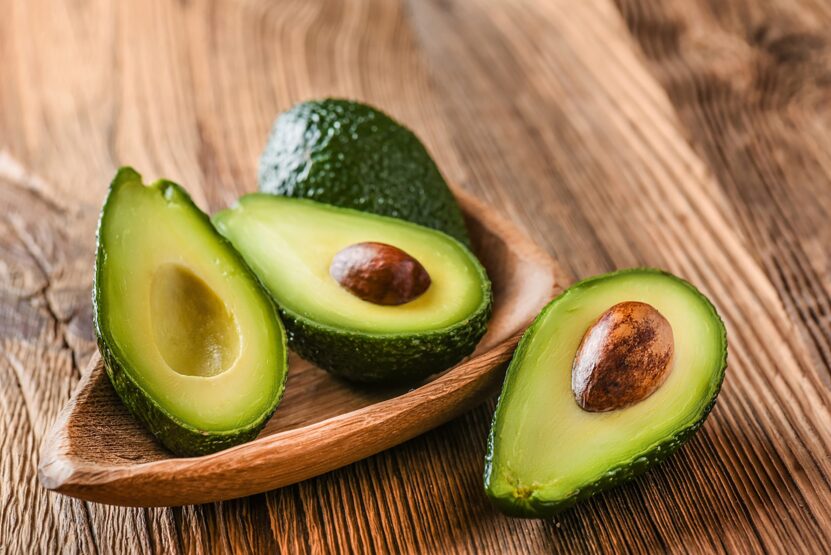
Avocados are packed with monounsaturated fats and help your body synthesize hormones. Research shows that avocados may increase insulin sensitivity and could play a role in improving hormonal disorders.
-
Fermented Foods

Probiotic-rich fermented foods such as yogurt and kimchi nourish the gut microbiome, which plays a direct role in hormone regulation. Recent studies have found that these foods have a profound influence on gut messengers that regulate appetite and mood, such as serotonin, GLP-1, ghrelin and somatostatin.
-
Whole Grains

These complex carbohydrates provide sustained energy and help regulate insulin. Whole grain bread, pasta, rice and oatmeal are also packed with thiamin and riboflavin, B vitamins needed to synthesize and eliminate some hormones. Their fiber content also helps with estrogen detox.
-
Berries
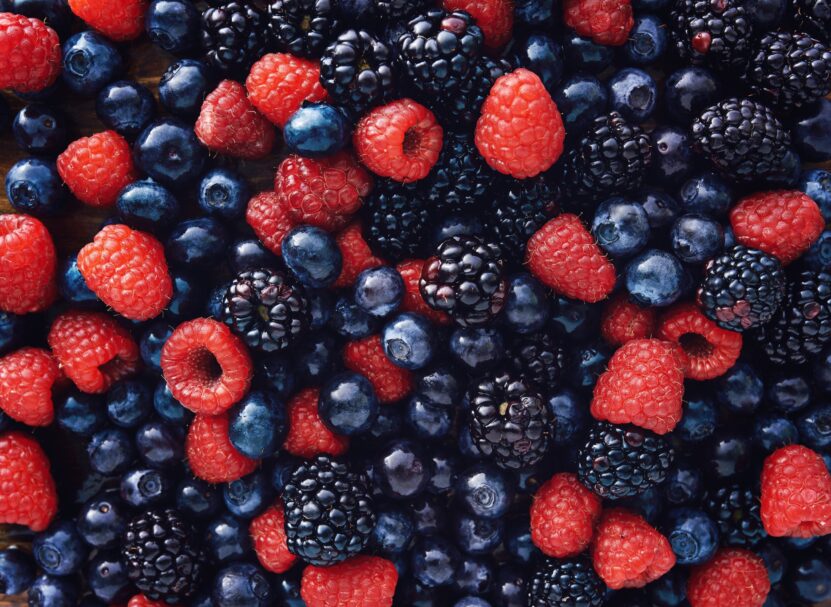
Berries are loaded with antioxidants and polyphenols and help reduce oxidative stress and inflammation, which supports hormonal function. They also enhance insulin sensitivity, helping regulate blood sugar and energy levels.
Food Combinations and Timing for Hormonal Health
Beyond what you eat, when and how you eat profoundly influences your hormonal health. Your body operates on a 24-hour cycle — your circadian rhythm — which coordinates endocrine secretions, digestion and sleep patterns.
Choosing food that balances hormones and eating in alignment with these rhythms can enhance energy during the day and promote recovery and restful sleep at night.
Food combinations are also an important consideration when eating for hormone health. Just as certain foods and wines are often paired to enhance flavors in a meal, they can also increase hormonal support.
By thinking carefully about what foods you put together and when, you can significantly impact how your body produces and responds to its endocrine factors throughout the day.
Eating the right food at the right time can also help minimize the need for hormonal supplements. For example, melatonin supplements for sleep should not be used for more than one or two months, whereas eating foods that naturally boost melatonin is a safe and effective way to protect your body’s natural rhythms.
Morning: Fuel Cortisol and Energy With Protein and Complex Carbs
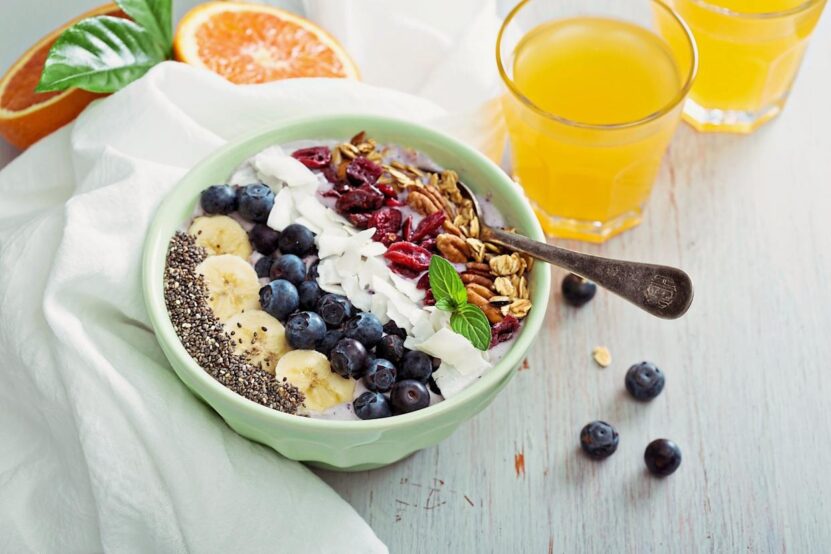
Cortisol naturally peaks within 30-60 minutes of waking up. This is your body’s way of energizing you for the day. Supporting this with a balanced breakfast of protein and complex carbs stabilizes blood sugar and prevents midmorning crashes. You could try:
- Oatmeal topped with ground flaxseed, almond butter and blueberries.
- Scrambled eggs with sautéed spinach and sweet potatoes.
- Plain yogurt with chia seeds and raspberries.
Midday: Maintain Focus With Balanced Macronutrients
A lunch with protein, fiber and healthy fats sustains energy, supports adrenal function and keeps your blood sugar stable. Consider:
- Quinoa salad with grilled salmon, arugula, avocado and lemon dressing.
- Lentil soup with whole grain bread and a side of fermented pickles.
- Roasted chickpeas with kale, sliced avocado and a sprinkle of flaxseeds.
Evening: Prepare for Sleep With Carbs and Tryptophan-Rich Foods
As the day winds down, your body begins producing melatonin and growth hormone for rest and repair, while cortisol release is suppressed. Tryptophan-rich foods like turkey, peanuts or oats can enhance melatonin production, especially when paired with carbohydrates that help tryptophan cross the blood-brain barrier. Examples include:
- Brown rice with roasted vegetables and grilled chicken.
- Warm bowl of oats with walnuts, banana slices and a sprinkle of cinnamon.
- Yogurt with pumpkin seeds and a drizzle of honey.
When to Seek Professional Guidance
If you’re experiencing symptoms like chronic fatigue, missed or irregular periods, unexplained weight changes or mood instability, it’s a good idea to seek help. A registered dietitian, endocrinologist or other health care provider can identify underlying causes and create a tailored plan.
Small Diet Changes, Big Hormonal Impact
Support your hormonal health by starting with one or two foods or habits. Over time, eating food that balances hormones will become second nature. These simple nourishing choices can transform how your body feels, functions and flows.







